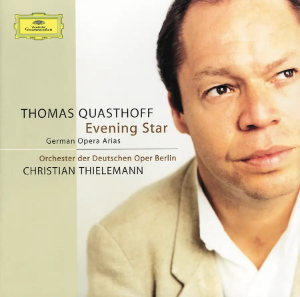
Thomas Quasthoff (bass- baritone)
Evening Star – German Opera arias
Christian Oelze (soprano)
Chor und Orchester der Deutschen Oper Berlin/Christian Thielemann
rec. 2001, Grosser Saal, Berlin Philharmonie
German texts with French & English translations
Deutsche Grammophon 471 493-2 [65]
Now retired, Thomas Quasthoff has left a considerable recorded legacy of cantatas, Lieder and operatic excerpts. This album consisting of eight arias from lesser-known German operas and two from Wagner’s Tannhäuser – the most celebrated of which gives the collection its name – is a testament to the beauty of his voice and his facility with text as an expert singer of Lieder and reminds us that prior to his musical career he was a radio announcer and did voice-overs for television. The depth and evenness of his timbre complement that verbal dexterity; he is technically flawless and especially expressive in his native tongue and his rich bass-baritone extends up to an easy G and A-flat.
The programme is nicely balanced, in that we begin with six arias typical of Lortzing’s jolly, melodious style which has more in common with comic operas by contemporaries such as Flotow, move into the high drama of Lysiart’s declamatory and ornamented aria from Weber’s Euryanthe, to the serene grandeur of Wolfram’s music from Tannhäuser, and conclude with one of Richard Strauss’ most felicitous of vocal confections, Morosus’ touching and gently comic aria ending Die schweigsame Frau. It also demonstrates the ease with which Quasthoff moves between bass and baritone tessituras.
There is more than a touch of G & S’ “Modern Major General” to the opening patter song by the highly self-satisfied mayor van Bett – although of course Zar und Zimmermann preceded The Pirates of Penzance by more than forty years. The same relationship might by observed between the ensuing number, in which he tries to enthuse his choir with the supposed beauties of his cantata, and the Somarone scene in Berlioz’ Béatrice et Bénédict – except again, Lortzing got there first by a generation. The partnership between Quasthoff and Thielemann works ideally and the contributions of the chorus are excellent. The only criticism one might make of Quasthoff’s delivery is that his vocalism is so good that some of the irony of the absurd smugness and aspirations of the puffed-up Bürgermeister might be negated by the listener’s admiration for it. Another mild criticism is that although DG provides texts, no context is provided for the tracks; instead we are given quite a quite “musicological” note which provides food for thought and even makes some debatable assertions, and a rather gushy essay “On the Same Wavelength” about the collaboration of singer and conductor, when the more useful contextual information missing would have been welcome. No matter – the words sufficiently convey the gist of the situations .
Quasthoff next adopts a suitably patrician style and affect for the Tsar’s sentimental, nostalgic song, which might be subtitled “Uneasy lies the head that wears the crown” – except that its gentle, lilting strophes hardly aspire to such profundity. The three items from Der Wildschütz, including an extended duet between Baculus and Gretchen, sung by a suitably keck Christian Oelze, are enjoyable but I would not say that their musical invention and quality rival that of the justifiably more popular Zar und Zimmermann. The content of the Count’s aria seems like a slightly paler variation of the Tsar’s from that opera but again a certain irony is conveyed by it being couched in a chirpy polonaise rhythm.
The switch from Lortzing’s hearty, Germanic folksiness to Weber’s sweeping, “grand-heroic” Romanticism is quite startling, but as I say above, the programme moves in the right direction. Despite the bloodthirstiness of Lysiart’s vows of vengeance, in the soft, central passage of his aria, Quasthoff succeeds in investing his complaints with considerable pathos. It is a pity that the opera itself is hobbled by a weak libretto, as its music is often terrific.
The two Wagner excerpts of arias from two different roles will be the items most familiar to opera-lovers and they could not be more satisfactorily delivered. Finally, despite it being the last item here, apart from the subtle beauty of the music itself, Morosus’ aria is one I would first play to demonstrate Quasthoff’s special gifts; it is exquisitely sung.
Ralph Moore
Buying this recording via a link below generates revenue for MWI, which helps the site remain free


Contents
Albert Lortzing (1801-51)
Zar und Zimmermann
1. O sancta justitia (van Bett)
2. Den hohen Herrscher würdig (van Bett, Chor)
3. Sonst spielt’ ich mit Zepter, mit Krone (Zar)
Der Wildschütz
4. Fünftausend Taler!… Träum oder wach’ ich? (Baculus)
5. Laß Er doch hören! -Bei diesem schlimmen Fall (Gretchen, Baculus)
6. Wie freundlich strahlt die holde Morgensonne (Graf Eberbach)
Carl Maria von Weber (1786-1826)
Euryanthe (Lysiart)
7. Wo berg’ ich mich? … Schweigt, glüh’nden Sehnens
Richard Wagner (1813-83)
Tannhäuser (Wolfram)
8. Gar viel und schön
9. Wie Todesahnung… O du mein holder Abendstern
Richard Strauss (1864-1949)
Die schweigsame Frau (Morosus)
10. Wie schön ist doch die Musik

















